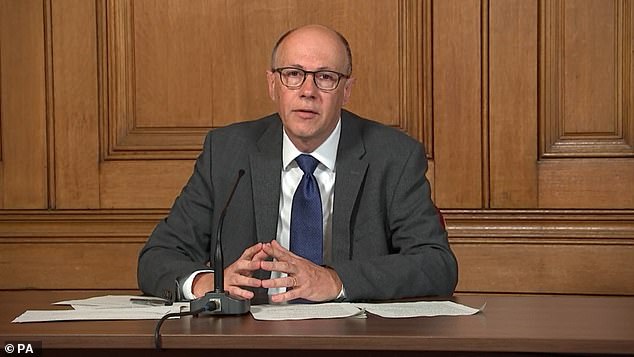Elderly coronavirus patients are being admitted to hospital at EIGHT TIMES the rate of young people, official figures show
- Professor Stephen Powis of NHS England warned of steep rises among over-65s
- He said over-85s eight times as likely as working age to be admitted with Covid
- And Prof Powis said those aged 65 to 84 are four times as likely to be admitted
Elderly people are being hospitalised with Covid-19 at eight times the rate of younger groups, official data shows.
Professor Stephen Powis, national medical director of NHS England, warned of steep rises among over-65s and an even faster acceleration among over-85s.
Speaking at a Downing Street briefing, Prof Powis presented a graph showing over-85s are eight times as likely as those of working age to be admitted with Covid.
Those aged 65 to 84 are four times as likely to be admitted – but admissions among under-18s are negligible.
The data will be used to support the argument that the elderly and vulnerable should be shielded while workers get on with driving the economy.
Professor Stephen Powis (pictured), national medical director of NHS England, warned of steep rises among over-65s and an even faster acceleration among over-85s
Thousands of doctors last week signed the Great Barrington Declaration, which called for a return to normality for the majority.
But Prof Powis dismissed it, saying: ‘The claim that without taking further action, the elderly can somehow just be fenced off from risk, I’m afraid, is proving to be wishful thinking.’
His figures showed admissions of the elderly shot up in recent weeks following a surge in infections among the young.
Professor Jonathan Van-Tam, the deputy chief medical officer, said: ‘Our resurgence of cases this autumn has been mainly in adults aged 22 to 29.
‘But there has been a spread from those younger age groups into the 60-plus age group.
‘This is of real concern. The elderly suffer a much worse course of Covid-19. They are admitted to hospital for longer periods and are more difficult to save.’

Professor Jonathan Van-Tam (pictured), the deputy chief medical officer, said: ‘Our resurgence of cases this autumn has been mainly in adults aged 22 to 29’
He pointed out there are currently more people in hospital with Covid than on March 23, when the national lockdown was imposed.
But he added: ‘We are in a better position than we were in March and April. Clearly we have learned many things from that first wave.’
He said use of drugs such as dexamethasone will help patients survive the virus, and doctors now know more about the best way to use mechanical ventilators.
‘And of course, we’ve also been able to prepare,’ he said. Prof Powis also acknowledged infections are rising at a slower rate than in March.
Sir Patrick Vallance, the chief scientific advisor, last month set out a scenario in which cases would double every seven days, which would mean 50,000 cases a day by mid October.
In reality Britain has seen fewer than 14,000 cases a day on average over the last week. A similar pattern can be seen in hospital occupancy.
Yesterday there were 3,451 people admitted with Covid across England. It took around two weeks for that number to double, from 1,721 on September 27.
But experts last night warned the fact that admissions are rising at all is extremely concerning.
Dr Shaun Fitzgerald, of the University of Cambridge, said: ‘A scenario of the NHS being completely overwhelmed is something we can’t allow, and unfortunately it seems inevitable more stringent restrictions on our movements will be needed.’
